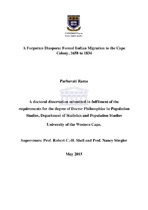A forgotten diaspora : forced Indian Migration to the Cape Colony, 1658 to 1834
Abstract
This thesis aims to explore Indian forced migration to the Cape Colony from 1658 to 1834. The forgotten diaspora‘ of its title refers to the first Indians who had come to the shores of South Africa, long before the arrival—between 1860 and 1911—of the indentured Indians. This diaspora has been forgotten, partially because these migrants came as slaves. The author uses data extracted from the newly transcribed Master of the Orphan Chamber (MOOC) series and slave transfers which are housed in the Western Cape Provincial Archives and Records Service (WCARS). The Cape colonial data is considered among the best in the world. Earlier historians such as Victor de Kock, Anna Böeseken, Frank Bradlow and Margaret Cairns, have made us aware of their existence primarily through Transportenkennis and Schepenkennis (transport and shipping information) documents in the Deeds Registry. Not nearly enough, however, is known about these Indian slaves, especially about those who arrived between 1731 and 1834. These lacunae include the number of arrivals; their sex ratios; ages and origins; and the circumstances under which they came. This thesis aims to construct a census of Indian slaves brought to the Cape from 1658 to 1834—along the lines of Philip Curtin's aggregated census of the Trans- Atlantic slave trade, but based on individual case level data coded directly from primary sources. This is the first time the size of the creole population born at the Cape will be established.

